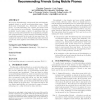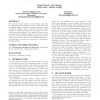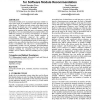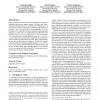110
Voted
RECSYS
2009
ACM
15 years 8 months ago
2009
ACM
We propose FriendSensing, a framework that automatically suggests friends to mobile social-networking users. Using short-range technologies (e.g., Bluetooth) on her mobile phone, ...
140
Voted
RECSYS
2009
ACM
15 years 8 months ago
2009
ACM
Recommender systems based on user feedback rank items by aggregating users’ ratings in order to select those that are ranked highest. Ratings are usually aggregated using a weig...
110
click to vote
RECSYS
2009
ACM
15 years 8 months ago
2009
ACM
Besides the rating information, an increasing number of modern recommender systems also allow the users to add personalized tags to the items. Such tagging information may provide...
RECSYS
2009
ACM
15 years 8 months ago
2009
ACM
We propose a novel collaborative recommendation approach to take advantage of the information available in user-created lists. Our approach assumes associations among any two item...
RECSYS
2009
ACM
15 years 8 months ago
2009
ACM
We propose a recommendation technique that works by collecting text descriptions of items and using this textual aura to compute the similarity between items using techniques draw...
112
click to vote
RECSYS
2009
ACM
15 years 8 months ago
2009
ACM
Conversation double pivots recommend target items related to a source item, based on co-mentions of source and target items in online forums. We deployed several variants on the d...
128
Voted
RECSYS
2009
ACM
15 years 8 months ago
2009
ACM
Different buyers exhibit different purchasing behaviors. Some rush to purchase new products while others tend to be more cautious, waiting for reviews from people they trust. In...
84
Voted
RECSYS
2009
ACM
15 years 8 months ago
2009
ACM
116
Voted
RECSYS
2009
ACM
15 years 8 months ago
2009
ACM
Utility or preference elicitation is a critical component in many recommender and decision support systems. However, most frameworks for elicitation assume a predefined set of fe...
103
click to vote
RECSYS
2009
ACM
15 years 8 months ago
2009
ACM
A common approach to designing Recommender Systems (RS) consists of asking users to explicitly rate items in order to collect feedback about their preferences. However, users have...




